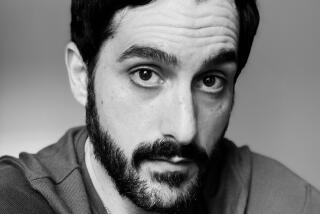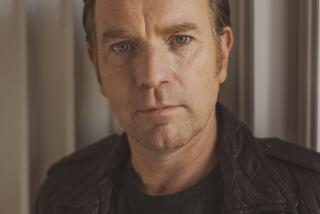Gay Chorus Strikes Chord in Russia
MOSCOW — Rarely do cultures clash with such harmony. Three-, four- and eight-part harmony, to be precise.
The Gay Men’s Chorus of Los Angeles came to Russia over the weekend, singing concerts on two of the country’s most venerable stages in a visit that also wound up stirring debate on a subject rarely discussed publicly here--homosexuality.
Indeed, the choral group’s four-day Russian trip turned into an eclectic cultural encounter session, with gays and straights, young and old, Russians and Americans mingling their ideas and identities at concerts, dance clubs and social events.
“Of course, the idea of a gay chorus is strange,” said Yevdokiya Grukova, a pensioner who said she bought a ticket to the Moscow show to “see what gays look like.”
“But the world has all types,” she added, “so why not a gay chorus, if they have the talent?”
The chorus, which was established in 1979, sang a program of classical, folk and Broadway tunes Saturday in Moscow’s Tchaikovsky Hall and Sunday in St. Petersburg’s Glinka Choral Hall to an audience response one singer called “overwhelming.”
“I got tears in my eyes,” said Marty Brier, a baritone and actor from West Hollywood, recalling one of the group’s encores, a Tchaikovsky song the members sang in Russian. “They knew the song immediately. You could just feel it.”
Jon Bailey, the chorus’ artistic director, had worked since 1991 to bring the group here, when political instability forced it to bypass Russia during an earlier Eastern European tour. Among the difficulties he had to overcome was the fact that there is no precise equivalent in Russian for the word “gay,” so some advertising in Moscow featured the group’s name in English, while many members of the audience in St. Petersburg appeared unaware initially of the sexual orientation of the nearly 100 men serenading them.
The fact that the tour turned out to be more than just a couple of concerts was due, in large measure, to the quasi-divine intervention of Russia’s uber-mega-superstar, pop diva Alla Pugachova.
Pugachova--Russia’s most beloved public figure, who combines the iconic stature of Barbra Streisand the earthy showmanship of Bette Midler--joined the group on stage Saturday for three songs, including a chorus of “We Shall Overcome.” But for Russians, her more important performance came a day earlier, when Moscow’s most popular newspaper published a lengthy interview in which she did something rare in Russia: openly discussed her love for her gay friends and urged Russians to consider homosexuality “a normal part of human existence, which was created by nature and God.”
“Maybe other people see this as a kind of manifesto,” Pugachova told Moskovsky Komsomolets. “But for me, it’s a normal human and professional act. I’m going to sing with a chorus I admire.”
Ed Mishin, who runs https://www.gay.ru, a Web site that serves as the country’s primary clearinghouse on gay and lesbian issues, said Pugachova’s blessing transformed the Moscow event from a simple concert into a cultural watershed.
“This event immediately achieved a much greater significance,” he said. “It shows my country that someone at the level of Alla Pugachova is not a homophobe, that she considers homosexuality normal. It may not be immediately evident, but I think it will eventually help lower the level of homophobia.”
As in much of the world, attitudes toward gays and lesbians in Russia vary widely. Homosexuality was rarely mentioned in Soviet times and, when it was, it was depicted as either a disease or a crime.
As a result, the vast majority of Russians know little or nothing about it. But gays and lesbians say that, for the most part, this ignorance does not translate into hostility.
In fact, despite a low level of public awareness, there are a number of cultural reasons that many Russians are far more accepting of gays and lesbians than Westerners might expect.
One reason is that most Russians, whether straight or gay, draw a clear line between their private and public lives, a habit well learned in Soviet times. And unlike in the United States, where the legacy of Puritanism still structures public debate, sexual conduct is rarely the subject of public moralizing here. Moreover, there is no tradition of “identity politics,” and people feel little need to announce a public identity.
Alexander A. Kukharsky, director of Krilija, a gay and lesbian association in St. Petersburg, points out that since homosexual conduct was decriminalized in 1993 and the age of consent was lowered to 14 in 1996, gays enjoy more freedom in Russia than in many Western countries.
“The legal status of Russian gays and lesbians is one of the best in the world today,” Kukharsky said. “I think the non-gay public is increasingly tolerant with each new-coming year. As for being openly gay in Russia, it seems to be about the same as in Western countries if you are living in a large megalopolis.”
Still, chorus members and the gays they encountered in Russia found some intriguing differences. At a dance club Friday night, many in the chorus found that they were nearly twice as old as the largely teenage patrons.
“Where are all the guys who aren’t 22?” asked Brier, who is all of 38. He was told that older gays in Russia tend not to go out much, in part because there are few gay meeting places except for discos.
Others noted the large number of women in the club, some of them lesbians, but others were straight women on the prowl for gay men. Sexual orientation here is less of an either-or proposition than in the U.S., and many people consider the line between straight and gay to be flexible.
“You’ll see women in gay clubs in the States, but they are largely asexual,” said Daniel Leclair, who is making a documentary film about the tour. “Here, they are sexual. You see men who are gay kissing them in the corners because it’s what they feel like at the moment.”
For their part, Russians remarked on the variety of ages of the men in the chorus, from 23 to 69, and on the fact that the men obviously were more established in their lives and careers than most of the club-goers.
Vasily Lebedev, a 19-year-old who shares an apartment with his mother and boyfriend, said he was too shy to approach the chorus members. And he expressed reservations about the group’s public declaration of sexual identity, suggesting that such an approach in Russia might only cause problems.
“I live the way I live. I tell the neighbors that he’s my brother,” he said, exchanging a glance with his boyfriend. “I’d prefer that homosexuality were discussed freely everywhere, but I think that’s simply impossible.”
Bailey, the artistic director, said that the group had not gone to Russia with any mission except to sing and that he was pleased the public response was so varied. He acknowledged, however, that the trip had some odd complications.
The name of the group, for instance. There are few good translations of “gay” into Russian. Gomoseksual means something akin to “deviant.” A less clinical word, goluboy, or “pale blue,” is pejorative. So in recent years, gays have in effect adopted the English word, which comes out in Russian as “gey.”
Still, the concert hall administrators felt that the term was still not widely enough known to use on posters. And they admitted that they were worried about “attracting the wrong kind of crowd.” So in Russian, the name of the group was rendered as “Men’s Chorus of Los Angeles” and, on many posters in Moscow, the name of the group was added in English.
“It was not an ideal situation,” said Tony Hastings, one of the tour promoters. “But we felt we had to make a compromise in the end because of the nature of the halls in which we were playing. It was a very big step for the Tchaikovsky Hall and the Glinka Hall to have a gay men’s chorus perform at all.”
The concert halls admitted as much.
“Our society is, unfortunately, not mature enough to perceive such things calmly,” said Vladimir I. Grishin, administrator of the Tchaikovsky. “Not everyone in Russia is ready to accept the fact that there is nothing wrong with gay men performing and emphasizing their sexual orientation.”
Such people were not in evidence in the Moscow audience, which appeared to be largely urban sophisticates, equal parts gay and straight, with a sprinkle of dowdy grandmothers and besequined celebrities.
In St. Petersburg, however, many concert-goers apparently were unaware of the group’s full name. The first time Bailey referred to it during the concert, there was an audible buzz from the audience.
“There were a lot of people there who thought we were just the ‘Men’s Chorus.’ As a result, it was a much more educational experience for the audience,” said tour organizer Hugh Davies. And without the theatrics of Pugachova, “it was also more intense musically.”
Sergei, a 25-year-old media executive who asked that his last name not be used, said that he enjoyed the musical program but that in the end, it mattered little to him what the chorus sang. It mattered that they sang at all.
“If we want to live in a civilized society, there should be no hidden topics,” he said. “This is the first time these subjects have been touched on such a high level. This may be the most important event ever for the gay community here.”
More to Read
The biggest entertainment stories
Get our big stories about Hollywood, film, television, music, arts, culture and more right in your inbox as soon as they publish.
You may occasionally receive promotional content from the Los Angeles Times.










